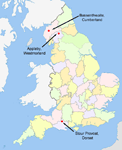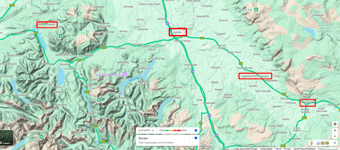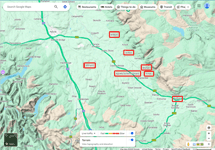The Ancestors of Donkin Dover
|
|
The most entertaining ancestor name in my family tree is Donkin Dover (1743-1820) because it's so similar to Dunkin Donuts. The name Donkin is probably a variation of the Scottish Duncan, and was not unusual in northern England in the 1700-1800 time period. There's a solid paper trail leading back from modern times to Donkin Dover, and the DNA agrees that he really is my ancestor. But it's a train wreck beyond his generation. Who were his parents? At first glance there seems to be a good paper trail, but it's more complicated than it looks. The English records for births, marriages and deaths for this time period aren't as informative as they could be. There are no birth records per se, but baptism was universal and usually took place shortly after birth (although long delays were possible). Baptism records show the child's name, the date, and the name of at least one parent. Marriage records show the date and the names of the bride and groom, but does not show other identifying information like their age or the names of their parents. Burial records show the name and date, but don't usually mention age or family members; however the burial record for a young child will often show the name of at least one parent. The survival of old records can be a problem; even when the documents are well taken care of, there can be problems with fading ink. Some inks stay sharp and clear for centuries while others fade away into invisibility. Paper can suffer from various types of damage. The original documents for the Dover family can't be viewed online, only transcripts, so we can't see what kind of condition they're in. But it looks like a lot of records may be missing. There were a lot of Dovers in Westmorland county and neighboring Cumberland county. Many of the Dover baptisms, marriages and burials took place at St Michaels Church in Appleby, Westmorland, so this article uses Appleby as its basic reference point for the Westmorland Dovers (and yes, Appleby does sound like another chain-restaurant tie-in). The first known Dover record at St Michaels in Appleby was in 1585, and it was relatively easy to track the family at first. But by 1650 there were too many Dovers to keep the families straight, and we can't tell where a lot of them came from. Either more Dovers were moving into the area, or (more likely) the children from the earlier generations were growing up and having families but the records didn't survive. Who's your daddy? Donkin was baptized in Brough under Stainmore (also known as just plain Brough) in Westmorland, England on Dec 9, 1743 (FamilySearch). He seems to have been the world's first Donkin Dover, and his distinctive name makes him easy to track. His father's name was William Dover, but which William is this? There is a William Dover son of Robert baptized in Appleby in May 1704 who looks like an excellent choice (FamilySearch). It's the right time, and three generations of William's ancestors were baptized in Appleby, so the family was well established in the area. There's just one problem. There is a William Dover son of Robert who was buried in Appleby two months later in July 1704 (FamilySearch), so it looks like this William didn't survive. There's no record of another William in the vicinity of Appleby who looks like a good candidate to be Donkin's father. But there is another candidate who lived a bit further away. A William Dover son of Daniel was baptized in Bassenthwaite, Cumberland in April 1710 (FamilySearch). This location is not ideal. Donkin and his children and grandchildren were born in the small towns around Appleby. Bassenthwaite is 36 miles from Appleby and 44 miles from Brough, where Donkin was baptized. That's a considerable distance. But the name Daniel is very significant. It was customary to name one's children after close family members, and Donkin had two sons named Daniel (the first one died in childhood so he gave the name to a subsequent son). The name Daniel was not popular at this time, and there's no record of a Daniel Dover in Westmorland until Donkin's father gave that name to Donkin's brother. There were a lot of Dovers in both Bassenthwaite and the Appleby area at this time, and some of them may have been closely related to each other. It's not unreasonable to think that William may have been born in Bassenthwaite but moved to the Appleby area. There is a burial record for a William Dover in Bassenthwaite in March 1711 (FamilySearch), but there's no indication that this is a child. It's more likely that this William is Daniel Dover's father, and not William the son of Daniel. The overall evidence suggests that Donkin's father was most likely to be William the son of Daniel. Who's your mama? And your siblings? Some online trees choose William son of Daniel to be Donkin's father while others choose William son of Robert. But in either case, they usually choose Mary Metyard to be his mother. There is a big problem with this. It's true that a William Dover married Mary Metyard in Stour Provost, Dorset in 1732 (FamilySearch). The name Dover is rare in Dorset, so it's very plausible that William came from somewhere else. We don't know why he'd do this since Stour Provost is a small rural village with no particular appeal to outsiders, but these things happen so it's possible. The biggest problem is what happened next. Stour Provost and Appleby are 300 miles apart, which was a huge distance at that time. The records show that William Dover baptized four children in the vicinity of Appleby and four in Stour Provost between 1738 and 1746, more or less alternating between the locations. The dates don't conflict with each other, but it's highly improbable that a family would be making a 300-mile trip between two unimportant villages almost every year. It's more likely that these are two different families. The children, listed by baptism date:
Is there a better candidate than Mary Metyard to be the mother of the Westmorland family? Indeed there is. A William Dover married Ann Soar at St Andrews Church in Penrith, Cumberland in May 1735 (FamilySearch). It's perfect timing, and Penrith is located midway between Bassenthwaite and Appleby, so it looks like William had ventured closer to the area where the Westmorland children were born. Unfortunately there don't seem to be any other records of Ann, so her ancestry is unknown. We can't prove that Donkin's father was William son of Daniel, or that his mother was Ann Soar. But it's a lot more plausible than the idea that his mother was Mary Metyard and his father was William son of Robert. It's possible that there's an entirely different William who spent his whole life in exactly the right area, but the records that would have identified him didn't survive. In any case, the recurrence of the name Daniel is such a compelling piece of evidence that his line looks like the right answer.
|
|
Other family history articles: The Trents: 1. Trent Y-DNA project results 2. Trent family tree 3. Trent landholdings 4. Frederick Trent of Tazewell/Logan county: how many Fredericks? 5. The Abraham Lincoln connection 6. Original documents The Jarrells: 1. Jarrell family tree 2. Jarrell landholdings 3. Who were William Jarrell's parents? 4. Who were Mary Sharpe's parents? 5. Was Susannah Parks a Cherokee? Other branches of the Jarrell/Herbert family: The Pocahontas problem The truth about Abner Vance The Canterbury family of Virginia The New Sweden line The Beach line: Richard Beach 1825-1900 Tribute to Edwin Thomas Beach On the paternal side: The Armingeon family
|
|
Article by Carolyn H (a descendant of Donkin Dover). 2025 All rights reserved |


